
The Oscar-nominated Foreign Correspondent was Alfred Hitchcock’s first large-scale international thriller to be released in theaters.
The New York Morning Globe appoints Johnny Jones (Joel McCrea) to serve as a foreign correspondent under the name Huntley Haverstock. On assignment to interview Universal Peace Party leader Stephen Fisher (Herbert Marshall), Jones encounters Dutch diplomat named Van Meer (Albert Bassermann). Meanwhile, he meets Fisher’s daughter, Carol (Laraine Day), at the party.
When Van Meer is shot at a conference, Jones jumps on the story, not realizing Carol and another reporter, Scott ffolliott (George Sanders), are in the car he commandeers. There’s a lot that happens from here on out–twists and turns that you never see coming! After all, it is a Hitchcock thriller–his first on a grand international scale.
This was one of the first pictures for Joel McCrea after he left Samuel Goldwyn’s company. In another universe, perhaps it would have been Gary Cooper in the starring role. The actor, however, turned it down. Hitchcock wanted Joan Fontaine and even though producer David Selznick was instrumental in bringing the British filmmaker to the US, he wouldn’t loan out the actress. In the end, McCrea and Day would lead the film’s cast.
Foreign Correspondent came about during an interesting time for the United States. For one, the country was still an isolationist at the time–meaning that there were no plans to go to war and support England. Hitchcock, a native from across the pond, sees it a different way and it shows through in his direction of the film, which drew multiple Oscar nominations. One of the ways is the decision to reshoot an ending following his return from England after learning that London was about to be bombed.
It’s a miracle that Foreign Correspondent got released at all. Getting a film rating at usually at the end of the process these days. However, this wasn’t the case during the era of the Production Code. No, Joseph Breen and his team had to be kept apprised of the script at just about every step of the process. The Code wasn’t the only thing going against the film. In making the film, Hitchcock would also challenge the Neutrality Acts. Based on Vincent Sheean’s memoir, the Code felt that the film “might arouse feeling against the present German regime.” Oh, it gets better. Another script version would be rejected. This time because a Civil War in Spain AND the treatment of Jews in Germany!*
Basically, Germany would be replaced by a fictional country whose inhabitants spoke backwards German. Hitchcock always had a way of finding loopholes! Regardless, both England and Germany were at war when the film came out in 1940.
Thanks to screenwriter Ben Hecht’s quick writing, the Hitchcock film is able to deliver a strong ending.
keep those lights burning. Cover them with steel, ring them with guns! Build a canopy of battleships and bombing planes. Hello America! Hang onto your lights! They are the only lights left in the world!
This comes as a result of Hitchcock’s trip to England. It served as a warning to America at the time–well over a year before Pearl Harbor.
One of two films directed by Hitchcock in 1940, Foreign Correspondent was just the beginning of his rise in American cinema.
DIRECTOR: Alfred Hitchcock
SCREENWRITERS: Charles Bennett & Joan Harrison (Screenplay); James Hilton & Robert Benchley (Dialogue)
CAST: Joel McCrea, Laraine Day, Herbert Marshall, George Sanders, Albert Bassermann, Robert Benchley
*Hitchcock and the Censors by John Billheimer




